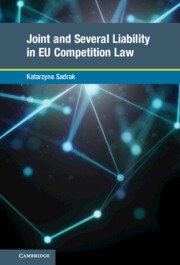Refine search
Actions for selected content:
3 results
5 - Liability Sharing Agreements
-
- Book:
- Joint and Several Liability in EU Competition Law
- Published online:
- 15 September 2022
- Print publication:
- 22 September 2022, pp 207-226
-
- Chapter
- Export citation
6 - Conclusions and Recommendations
-
- Book:
- Joint and Several Liability in EU Competition Law
- Published online:
- 15 September 2022
- Print publication:
- 22 September 2022, pp 227-232
-
- Chapter
- Export citation

Joint and Several Liability in EU Competition Law
-
- Published online:
- 15 September 2022
- Print publication:
- 22 September 2022
